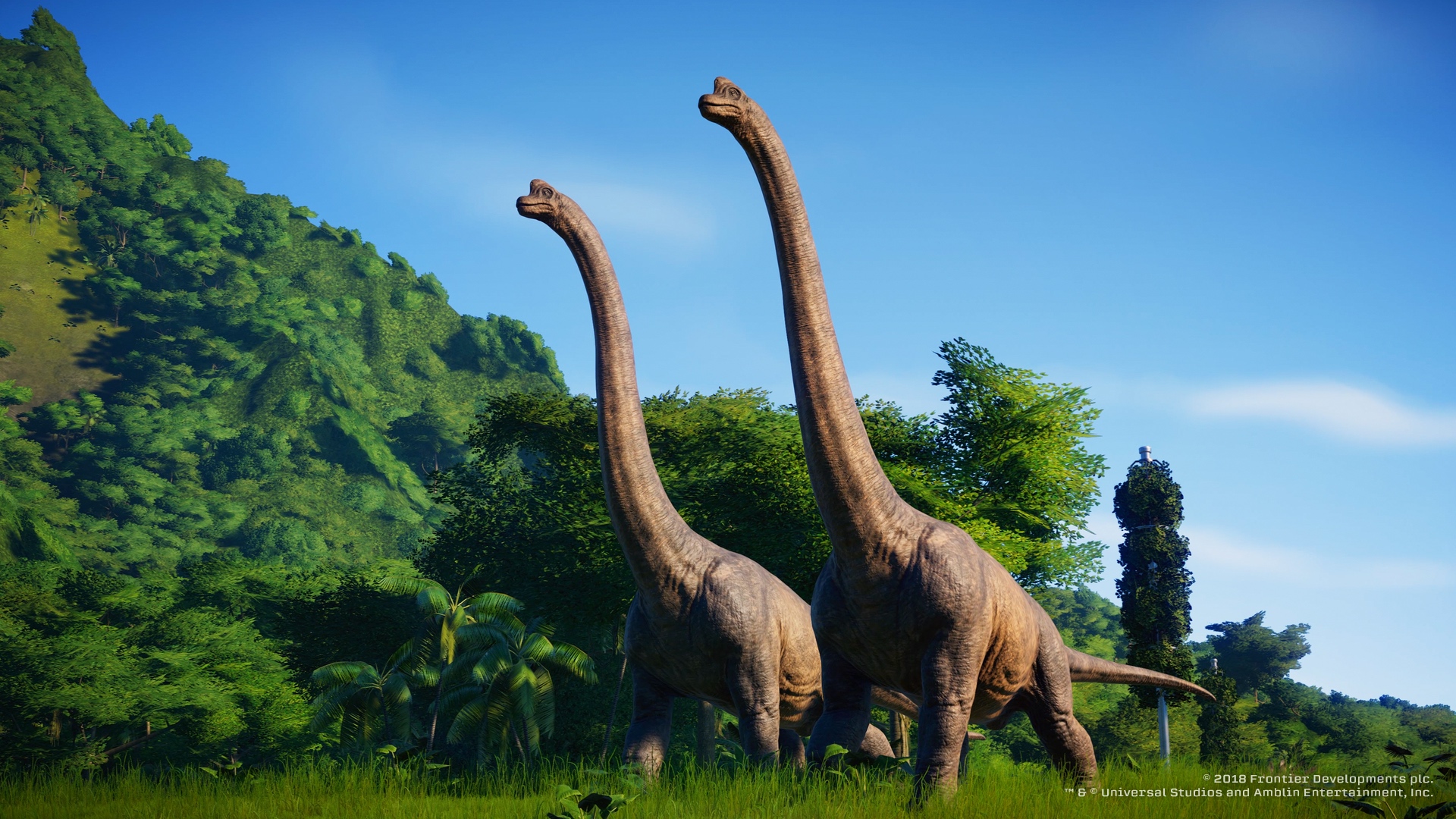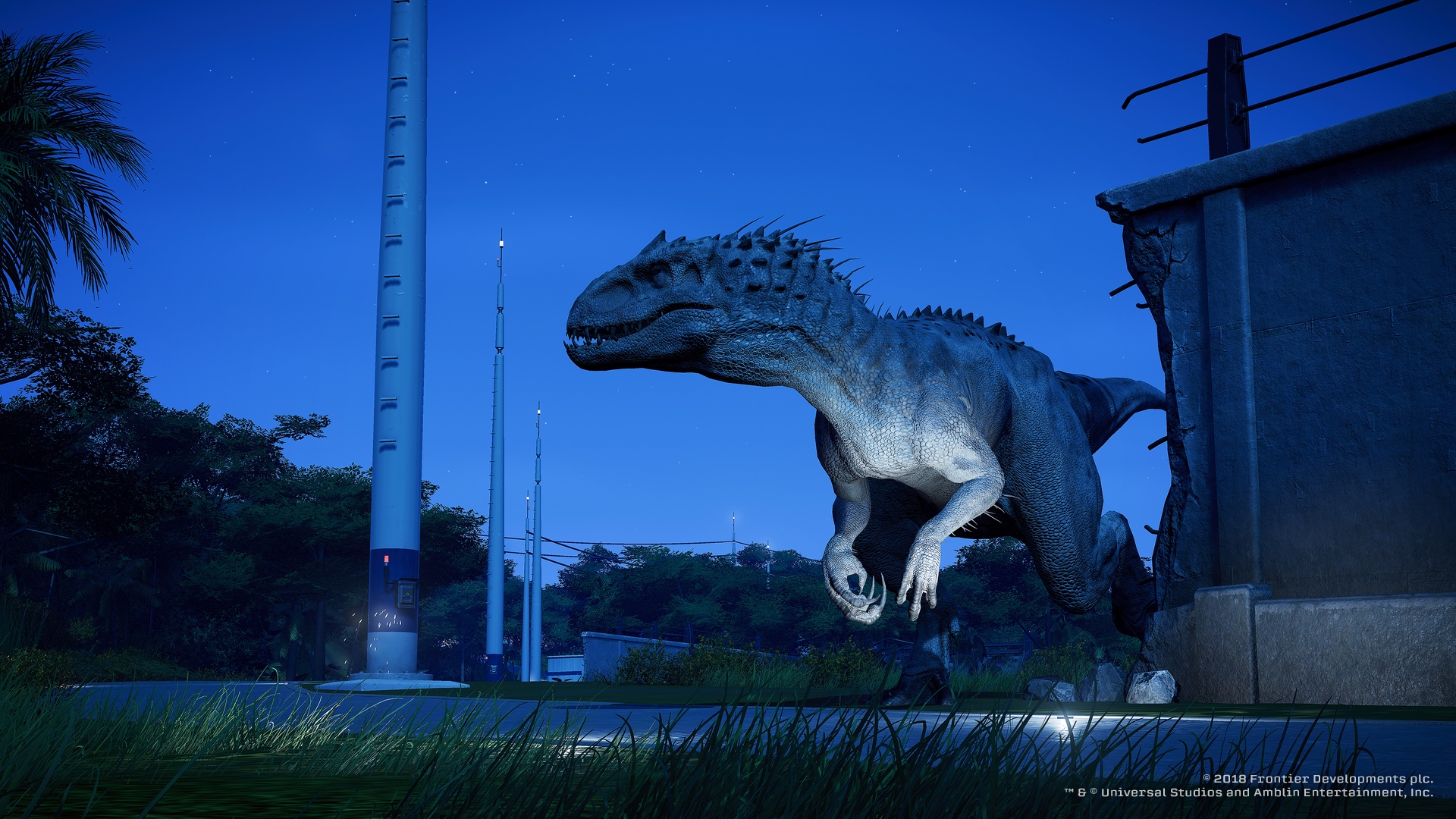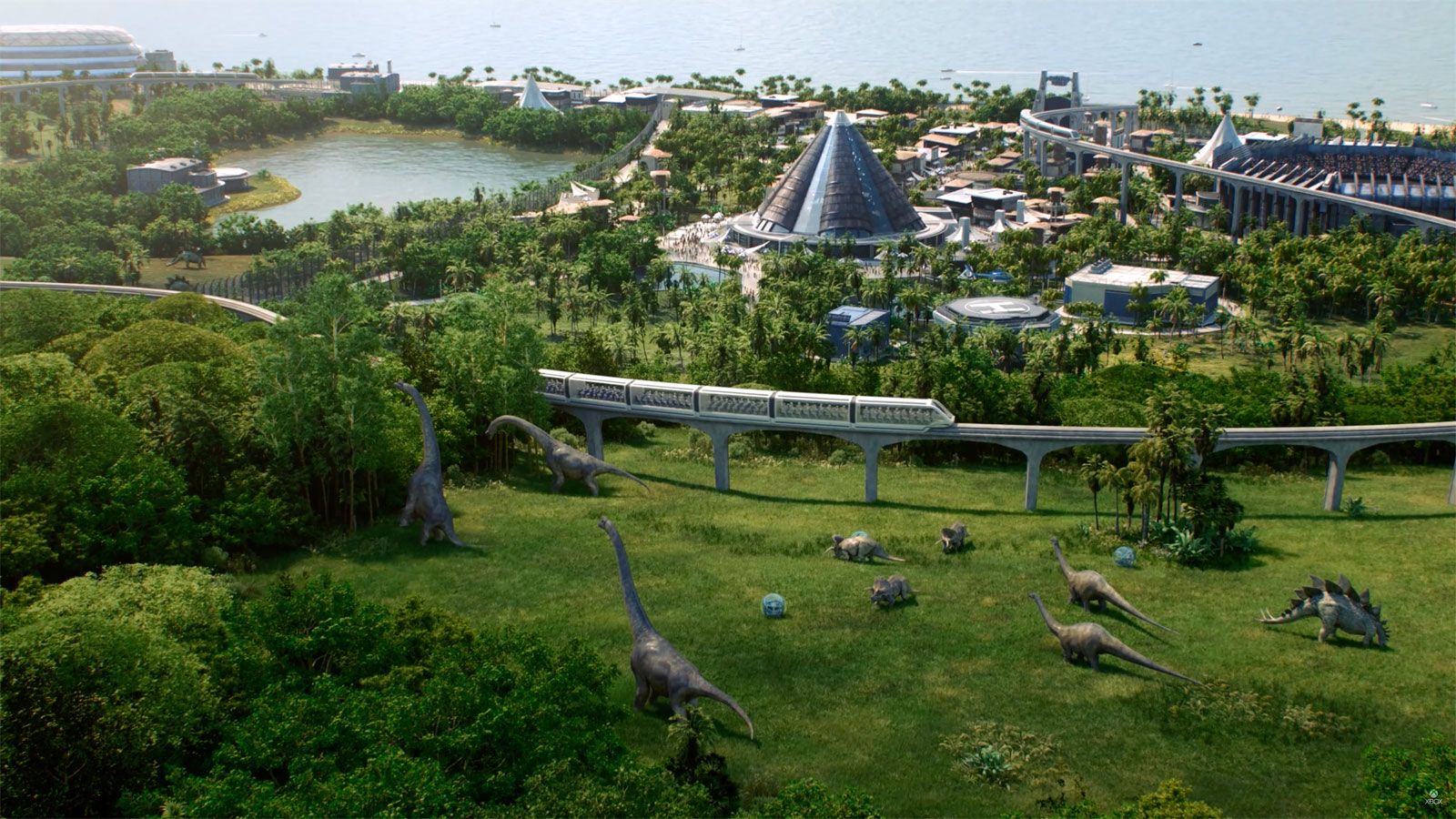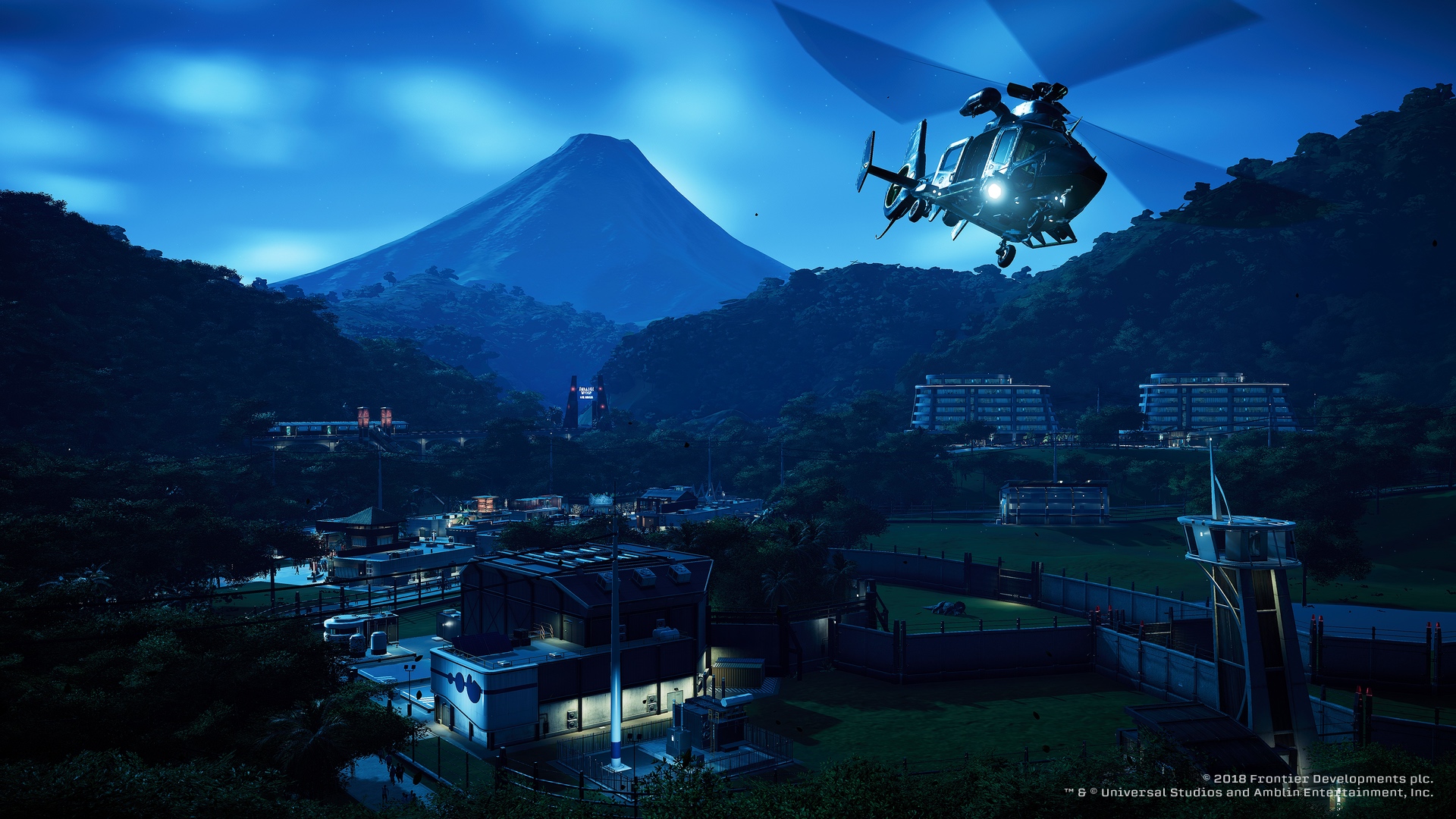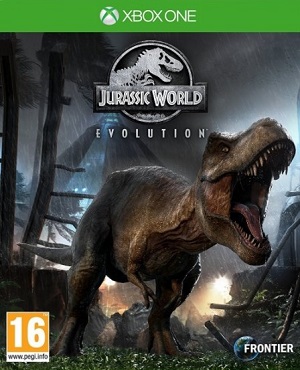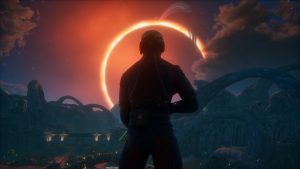
Jurassic World Evolution is the most fun I’ve had playing a game in years. I’m not talking about appreciating a game’s technical proficiency, or being lost in a very well told story, or marvelling at the incredible design of a game’s world. Certainly, there have been a lot of titles in 2018 itself that are better games, better products, with fewer flaws and far more points of notable perfection. But the absolute, pure, unadulterated joy I’ve felt in all my time with Jurassic World Evolution – and am surely bound to feel in all the countless more hours I am going to spend with it – is something I haven’t felt while playing a game in a long, long time.
A lot of that is probably down to the fact that I’ve been a fan of the Jurassic Park movies – and really, the very idea of dinosaurs in general – since I was a kid, like millions others have been, and Jurassic World Evolution is overflowing with love for both those things. The game is full of fan service for those who enjoyed the movies. John Williams’ soundtrack is in the game, and is used to wonderful effect. Several characters from the franchise are included as well, such as Henry Wu, Claire Dearing, and Ian Malcolm, all voiced excellently by their original actors, with Jeff Goldblum in particular delivering a typically amazing performance (though the person doing the Chris Pratt impression does a laughably bad job). The lore of the films is very much ingrained in the game as well, from little things such as the names of the buildings you can create and the skins you can use on your park rangers’ vehicles, to more noticeable stuff, like frequent callbacks to major events in the franchise across the location of its five main islands. Hell, even the names of the game’s Trophies and Achievements are all quotes from the movies.
"The absolute, pure, unadulterated joy I’ve felt in all my time with Jurassic World Evolution is something I haven’t felt while playing a game in a long, long time."
In all these ways and more, Jurassic World Evolution feels like a love letter to the films it spawns from, and it feels very authentic and genuine in doing so. But even for people who may not be such huge fans of the films, or may not even have watched them at all, Evolution manages to be an engaging and thoroughly addictive management sim experience. The concept of managing your own zoo-slash-theme park with the main attractions being dinosaurs that have been genetically brought back to life is an inherently fascinating one, and Evolution brings that concept to life in truly excellent ways.
For starters, the game is structured quite interestingly. It takes place across the collection of five islands that in the movies is known as Los Cinco Muertes, or “the Five Deaths”. You start off with just one island, and after hitting certain landmarks, you progress to the next one- though you can return to your previous islands anytime you want, you can only progress to the next island once you’ve accomplished a certain set of tasks. Each island progressively ramps up the difficulty and the complexity of tasks and management objectives you need to fulfil, and though things can seem simplistic and slow-going at first, the constant forward-momentum of the game as it presents you with new situations and newer, more difficult objectives makes the entire process extremely gratifying. You’re constantly learning new things, constantly getting more and more acclimatised with the game’s mechanics and what it expects you to do, so that when a dozen hours in you’re juggling countless things at the same time, you still don’t feel overwhelmed. The constant sense of progression is incredibly satisfying, and feels very rewarding.
This structure also makes sure that the game never gets stale or predictable. Once you move on to a new island, you’re presented with entirely new situations to contend with. One island might have you dealing with devastating storms, while another might task you with bringing a failed park back up and making it a profitable venture again, while yet another might give you limited and cramped spaces, and tell you to make do and set up a successful park anyway. Going into more detail about what kinds of opportunities and challenges each island presents would be spoiling it, but each new location brings with it a refreshing change of pace and entirely new things to look forward to, dread, and grapple with.
"The concept of managing your own zoo-slash-theme park with the main attractions being dinosaurs that have been genetically brought back to life is an inherently fascinating one, and Evolution brings that concept to life in truly excellent ways."
Once you’ve done all the main things the campaign requires you to do on all five islands – which can take around twenty hours – the game takes you to Isla Nublar (a location fans of the movies will be familiar with), which is essentially Evolution’s sandbox mode. Here, you can make use of all the content you’ve managed to unlock so far. While it’s true that this gating of a true sandbox mode could indeed have been a pretty notable flaw (and might still be for some people), the way the campaign is structured and progresses makes sure that that doesn’t end up happening. That’s because other than being incredibly rewarding, the campaign and its constant ramping up of complexity also serves to familiarize you with the game’s intricacies and complexities, and without this, the learning curve would be very steep- as it is, the game can provide quite a fair bit of challenge.
The very core of any Jurassic experience is, of course, the dinosaurs – it’s what we’re all here to see, it’s what makes people flock to this franchise in the millions – and the dinosaurs in Evolution are absolutely glorious to behold, in every way possible. Visually, they look and sound amazing, and simply watching them move about in their enclosures and interact with what’s around them is a hypnotic experience. There were countless stretches of dozens of minutes when I found myself doing nothing at all, with my camera simply zoomed in on the marvellous creatures as they went about their business. From the majestic and lumbering Brachiosaurus, to the vicious and agile Velociraptors, to the fearsome and deadly T-Rex, each dinosaur in the game has been brought to life with incredible detail, right down to every single one of their movements. Every time you successfully incubate a dinosaur and release it into its paddock, the game shows you a cutscene of the animal coming out into the world for the first time in its life, and it wasn’t very often that I wanted to skip these cutscenes- not even when I was releasing my tenth Velociraptor (or even my twentieth).
Moving beyond the visuals, the game integrates the dinosaurs into its mechanics with similar excellence. Each species has its own specific set of personality traits and requirements, with a variety of stats determining what they prefer in their environments, from the size of the area of open grasslands and forests they need, to how many dinosaurs of other species they want or do not want in their presence, to how many of their own kind they prefer to have around them. Building enclosures for dinosaurs as per their requirements is very important, and conversely, such things also need to be kept in mind while releasing new species into already existing enclosures. Once you’ve put your prized animals into their enclosures, you then need to make sure that they are well-fed and healthy. If a dinosaur feels like its enclosure isn’t up to its needs and wants, it eventually becomes agitated, and tries to break out of its enclosure- which, obviously, is something you don’t want.
"The very core of any Jurassic experience is, of course, the dinosaurs – it’s what we’re all here to see, it’s what makes people flock to this franchise in the millions – and the dinosaurs in Evolution are absolutely glorious to behold, in every way possible."
There’s a lot more to pay attention to in Jurassic World Evolution than just the dinosaurs, though obviously that is the main attraction. For instance, even though the guests in your parks, just like ourselves, are here, first and foremost, for the dinosaurs, there are other things that they need from you as well, amenities and facilities to keep them happy during their visit to your islands, to make sure your park rating stays at at least a respectable level. As such, you need to build means of transportation (such as the monorail or gyrospheres from Jurassic World), places where they can eat, places where they can buy toys or souvenirs or clothes (all Jurassic World-themed, of course), places where they can pass the time when they’re not looking at dinosaurs (such as bowling alleys). In a neat touch, you can also decide how much money all these places charge for providing their services, and the resulting revenue all counts towards your profits (or losses) as well.
Beyond that, the core management aspects of Jurassic World Evolution are, like so much else in the game, very true to what you’d expect from a proper Jurassic experience. Things such as power outages and storm hazards have been putting people’s lives at risk in the Jurassic Park films since 1993, and Evolution weaves that stuff into its core gameplay loop excellently. Every once in a while, a storm might kick in, so you have to make sure that your structures – especially your power plants – are storm-protected, otherwise you might find yourself dealing with failed security. It goes without saying, but that almost always leads to rampaging dinosaurs killing guests left, right, and centre. You also have to regularly send out expedition teams to look for DNA and fossils, so that you can not only keep finding new dinosaur species to create, but also to keep improving the genomes you already have, in order to make more authentic beasts, and also to have much higher chances of successful incubations.
Evolution also presents you with certain smaller objectives to complete at regular intervals, known as contracts, which are assigned to you by your park’s three main division- Security, Entertainment, and Science. It is, of course, up to you to accept or reject these contracts, but completing contracts increases your rating with the division you’re working with, and as your relationship with these divisions improve, they each unlock unique facilities that you can then make use of in your park. It all feeds back into a single collective loop, but these three divisions are also always competing against each other, and choosing which of these to please and weighing that against what things you need for your park can be a delicate balancing act.
"The core management aspects of Jurassic World Evolution are, like so much else in the game, very true to what you’d expect from a proper Jurassic experience."
That said, there are often times when these contracts feel a little randomized and either don’t fit with the division that’s handing them out (why would the Security division care about extracting new species of dinosaurs?), or present you with tasks that you have either already accomplished, or simply cannot yet accomplish. The immediate rewards for finishing these contracts are also often less than spectacular, making this perhaps one of the only weaknesses in Jurassic World Evolution’s immediate gameplay loop. Another issue of note is the fact that there is often a lot of downtime in the game, especially in its earlier stages when you’re still coming to grips with its systems, when you have very little to do. In these moments, there’s a lot of waiting around- waiting for your new fossils to arrive, or waiting for your dinosaurs to be successfully incubated, or waiting for a particular bit of research to be completed. Later on in the game, when the complexity ramps up and you have multiple things to do, it’s easy to keep yourself distracted and focus on other tasks while all this stuff happens, but early on, that’s not necessarily true. Sure, you can pass the time by looking at your dinosaurs- but you may not be as crazy about dinosaurs as I am, so you may not find that as enjoyable.
But such flaws ultimately count for very little when you pull back and look at the entire Jurassic World Evolution experience as a whole. This is a game that is brimming with incredible attention to detail, and excellent authenticity in everything it does. It’s a game that is unbelievably addictive and utterly engaging, a game that can eat up hours of your time without you even realizing it. It’s a game that you sit down to play in the night, and end up remaining hooked to your screen till the early hours of the morning after. It’s a game that you’ll love if you’re a fan of the franchise that it is based on, but will still find yourself thoroughly enjoying even if that may not be the case. Evolution developers Frontier Developments have succeeded where John Hammond failed, and have successfully brought to life the wildest and most wonderful dreams of every child. In the end, I find it very easy to endorse this park.
This game was reviewed on the PlayStation 4.
The dinosaurs look and sound amazing; An unbelievably addictive and engaging experience; Crammed with incredible attention to detail; Feels like a very authentic Jurassic Park/World experience; The campaign is structured incredibly well, and always keeps things fresh and entertaining; The constant growth in complexity and sense of progression is very rewarding; Makes excellent use of the Jurassic World license in several ways, from the music, to the voice overs, to the in-game callbacks; An incredible management sim, irrespective of the license.
Occasional downtime; Randomized contracts.









